Thematic Highlights

The Future of Work and Workers’ Rights
The impact of digital technologies in the labor market and the shifting nature of work in the platform paradigm has emerged as the central peg of focus for our research and advocacy. This year, we built on the solid foundation of past work to continue tracking the evolution of this dynamic in multiple ways.

 KEY MILESTONES
KEY MILESTONES
- Shaping discourse through popular writing and media. Through our podcast series, ‘Platform Predicament – Making Sense of a Datafied Future of Work’, we explored the issue of worker data rights and the new meanings of labor rights in the digitalizing context. We also brought out a number of think pieces and essays on labor issues, of note among which is our May Day series for DataSyn, which engaged with the pandemic’s long shadow on work and worker rights.
- Building out the field through research. Our team worked on a number of research initiatives tracking this space. We developed inputs for the consideration of the ILO Meeting of Experts on Decent Work in the Platform Economy in 2022. We also undertook an ambitious landscape study assessing the impact of digital technologies on work and workers, to develop actionable insights to aid the philanthropic sector’s decision-making and programmatic agenda in this domain.
 WHAT’S ON THE HORIZON?
WHAT’S ON THE HORIZON?
- A global strategy event convened in collaboration with international union federations looking at the future of worker rights and their crucial intersections with data rights
- A study in collaboration with the Centre for Labour Studies at the National Law School of India University, Bengaluru that seeks to understand the algorithmic management impacts in the ride-hailing and food delivery sectors
Recommendations from the Vault
- Check out outputs from one of our latest studies, ‘The Future of Work We Seek: A Philanthropic Agenda for Workers and the Digital Economy’
- Listen to all episodes of our podcast, ‘Platform Predicament – Making Sense of a Datafied Future of Work’. You can also check out this blog post that synthesizes key themes emerging from this podcast

Dismantling Big Tech
This year, we expanded our work on Big Tech, exploring through writing, research, and advocacy the policy directions necessary to rein in the monopolistic tendencies in the platform economy, and reclaim the potential of data for equitable development.
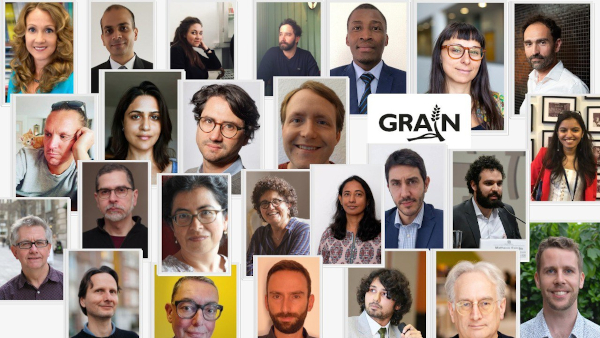
 KEY MILESTONES
KEY MILESTONES
- Launching the ‘State of Big Tech’ report. To build strategies to respond to the aggrandizement of Big Tech power, we launched our flagship report on the state of Big Tech, mapping the maneuvers and machinations of large digital corporations and providing course corrections for democratic governance of the digital economy. A unique aspect of our report is its inclusion of strong development voices from social movements, with our partners at GRAIN, the People’s Health Movement, FIAN International, and Our World is Not For Sale (OWINFS) serving as contributors.
- Engaging with platform regulation. We engaged with important regulatory developments coming out of India with respect to the digital economy and data governance, including notably the Government of India’s Intermediary Guidelines and Digital Media Ethics Code.
- Building a network of Big Tech and Society Media fellows. This year, we also set up a fellowship program to enrich our newsletter, DataSyn’s, scope and range. Our dynamic cohort of Big Tech and Society Media fellows allowed us to tap into an exciting new pool of long-form contributions and media outputs that will be published in future issues.
 WHAT’S ON THE HORIZON?
WHAT’S ON THE HORIZON?
- A new multi-modal initiative on Big Tech crimes that takes our work on challenging corporate power in the digital economy to the next stage
- Engagement with the Global Digital Justice Forum and upcoming WSIS+20 processes to challenge corporate influence in multilateral policymaking
Recommendations from the Vault
- Read our piece, ‘The Big Wave of Platform Regulation is Here – What’s Next?’
- Check out this Business Standard article outlining our take on the ‘Make Amazon Pay’ global campaign

The Political Economy of Data and AI
The architecture of the digital is co-opted to serve big business, through seductive narratives of efficiency and seamless convenience. Concerns of privacy, dignity, and autonomy are pushed to the background, in the incessant extraction that drives digital capitalism. Our work has advocated using data and its associated ecosystem as a knowledge commons through a measured approach that deters flagrant exploitation by the private sector, especially deep-pocketed Big Tech companies.
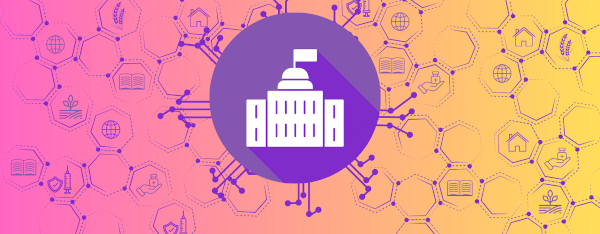
 KEY MILESTONES
KEY MILESTONES
- Building out the field through research. We worked on a range of research outputs and media articles on various data debates, including on the role of public goods in rebalancing the e-commerce sector, the efficacy of national-level legal-policy frameworks in addressing workers’ data rights, possible approaches to community data, and a multilateral framework for data and AI governance.
- Critical policy interventions. We responded to developments in the national data and digital policy space in India with agility over the year, making timely and critical interventions into public consultations such as the Draft National Data Governance Framework Policy and the Digital Personal Data Protection Bill.
- Broadening the data governance conversation. We sought opportunities to further original discourse on data governance. For instance, we brought together leading academics working on competition law, knowledge commons, and data economy valuation from the EU with technologists from India and representatives from UNCTAD and the South Centre. This workshop will serve as a pivotal stepping stone for further engagement with key policy stakeholders in these spaces.
 WHAT’S ON THE HORIZON?
WHAT’S ON THE HORIZON?
- A research project on digital public infrastructures
- Convening a global Platform Cooperativism Conference in late 2023
- A roundtable and essay series on generative AI debates
Recommendations from the Vault
- Read our policy brief on ‘Cross-Border Data Flow With Data Rights’, where we proposed a new framework to govern data flows
- Check out this piece discussing the potential of digital public infrastructures in e-commerce

Gender Justice in the Digital Paradigm
Our research and advocacy adopts a feminist lens – interrogating new forms of erosion of the public and the commodification of the private in the digital paradigm. We take stock of these implications, striving for a new political grammar of feminist digital justice.
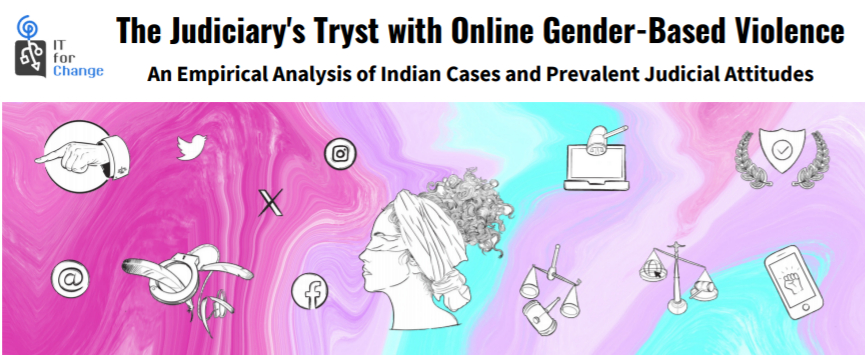
 KEY MILESTONES
KEY MILESTONES
- Building out the field through research. In a first-of-a-kind study, we carried out empirical analysis of Indian case law with respect to online gender-based violence. This study, which looks at 90 cases examining judicial responses to different kinds of cases of technology-facilitated gender-based violence, has yielded striking insights into the pervasiveness of certain regressive patriarchal stereotypes, particularly related to non-consensual intimate image distribution cases.
- Making crucial policy interventions. We contributed gender perspectives to the development of key national policies in 2022, including the NITI Aayog’s Platform India strategy and the expert committee of the Kerala Development and Innovation Strategic Council’s digitalization and knowledge economy strategy. We also engaged with the W20 – a platform focused on gender equality – to equip them in integrating digital perspectives into the Indian government’s G20 outcomes in 2023.
- Strengthening feminist scholarship. We made numerous efforts to diversify and support original feminist scholarship on key questions of gender and the digital economy. This included creating a fellowship cohort of young women scholars from India, and coordinating a compendium of essays on ‘Feminist Perspectives on Social Media Governance’.
 WHAT’S ON THE HORIZON?
WHAT’S ON THE HORIZON?
- Building a resource guide for members of the judiciary on online gender-based violence
- Capacity-building programs directed at members of the judiciary and the legal fraternity, as well as college and school managements
- Expanding research into women gig workers and social infrastructures of care for a feminist future of work, gender and fintech, social and solidarity economy enterprise models for the platform-data epoch, with a view to engage in evidence-based policy dialogue
Recommendations from the Vault
- Read about gender-based abuse on the Metaverse in this Bot Populi piece
- Check out think pieces from our ‘Gender Perspectives on the Digital Economy’ collection
- Peruse our curated compendium analyzing the role of misogyny and sexism in inhibiting the right to equal political participation in the platformized public sphere

Prakriye Field Center for Community Informatics and Development
Since 2005, our Prakriye field center has been leveraging new digital technologies for socio-political empowerment of women and adolescent girls from marginalized communities in three sub-districts of rural Mysuru in south India. Two strategies are at the heart of the Prakriye center’s efforts: a network of seven community information centers that are the nodes of a women-oriented information and knowledge ecosystem at the grassroots; and a para-counselling service comprising 37 gender help desks providing a first port of call for emergency responses to domestic violence.
PRARKIYE IMPACT AT A GLANCE
| 20+ | Short films and digital stories produced |
| 265+ | Screenings held in operational villages |
| 6,000+ | women, men, adolescent boys, and girls reached through screenings |
| 75+ | Joint public meetings held |
| 2,300+ | Women and adolescent girls participated in public meetings |
| 1,900+ | Entitlements and claims processed through Namma Mahithi Kendras |
| 750+ | Women across 24 villages trained on women's rights, and leadership |
| 140+ | adolescent boys and girls trained on gender rights |
 KEY MILESTONES
KEY MILESTONES
- Creating support networks. We convened Namma Maathu (discussion) Forums for women in 24 villages in Mysuru’s Hunsur and HD Kote blocks involving the participation of as many as 700 women. With a view to providing a reliable network of support for women and girls facing violence, we initiated Sangha support group meetings, continuing the conversations from the Forums.
- Mobilizing young people. To increase the effectiveness of our work on gender justice, we introduced new strategies, including school-based interventions, workshops, and tech meets. We are also building a cadre of ‘community media champions’, by working with adolescent girls to develop and hone their media skills.
- Expanding footprint through grassroot leaders. We recruited new Gram Sakhis, village-level community mobilizers, who will be responsible for sharing public information with women in the villages we cover.
 WHAT’S ON THE HORIZON?
WHAT’S ON THE HORIZON?
- New directions for Prakriye and its information centers based on impact evaluation of the Namma Maathu, Namma Jaaga project
- Deepening interventions with men and adolescent boys through new strategies
- Identifying leaders from among the Namma Maathu Forum participants to build their capacities, and deepen their feminist perspective
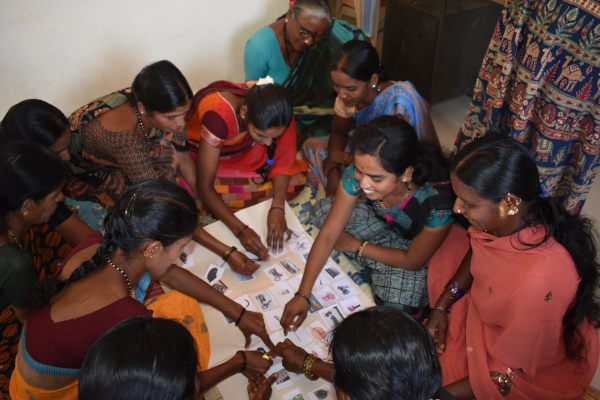

Education and
Technology
The long shadow of the pandemic continues to expose and accentuate the stratification in the Indian school system, while giving impetus to an unchecked, unaccountable digitalization in education that robs the sector of its public nature. Through our work, we strive to support and advocate for the idea of education as a public good as the sector struggles to address these challenges.
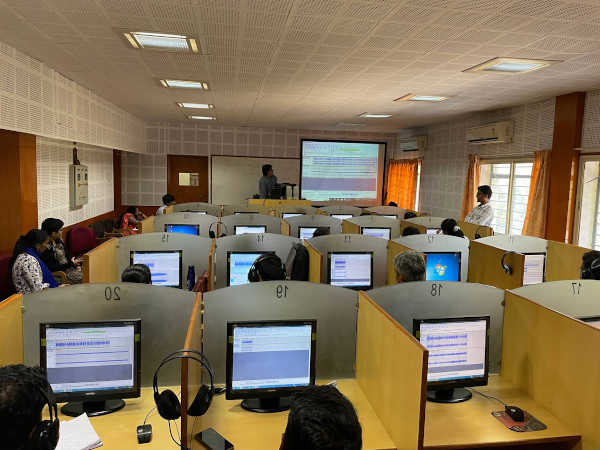
IMPACT AT A GLANCE
| 2,600+ | teacher capacities built |
| 40+ | workshops organized |
| 8 | courses conducted |
| 20+ | academic institutional collaborations |
| 7 | states covered |
| 600+ | Open Educational Resources created |
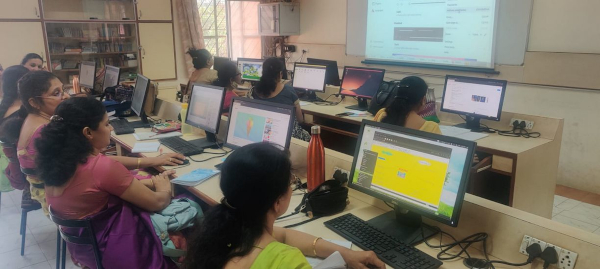
 KEY MILESTONES
KEY MILESTONES
- Undertaking capacity-building initiatives with educators. We conducted numerous webinars, courses, and workshops on integrating technology into education. Our Massive Open Online Course (MOOC) on ‘Teaching Mathematics with Technology’ (TMT), which was conducted in collaboration with the Commonwealth of Learning (COL), was highly sought after, with more than 1,000 teachers from across the globe registering and participating in the offering. IT for Change, in collaboration with the COL, also conducted a course for women professionals in higher education institutions in India to equip them with a critical understanding of gender, technology, and education and improve working knowledge on safe internet use. We also conducted an online course for government high school teachers across Karnataka to design safe spaces for adolescent girls. Last, but not the least, we designed and developed online courses for various public educational institutions as part of their programs, including for Kendriya Vidyalaya Sangathan, Tata Institute of Social Sciences, and the University of Calicut; and conducted blended programs for student-teachers from Vijaya Teachers College, Sarvajna College of Teacher Education and NMKRV College for Women.
- Engagement in curriculum and resource development. We partnered with the Tamil Nadu Samagra Shiksha and SCERT - Tamil Nadu to set up their Open Education Resources portal, using the MediaWiki FOSS platform. Additionally, in collaboration with the Regional Institute of English South India (RIESI), we supported the development of district-level professional learning communities of teachers, and also assisted pedagogical improvements through multilingual approaches for English language teaching. Our latest course, ‘Teaching Thinking through Concept Mapping’ was popular in both pre-service and in-service teacher education.
- Bringing out outputs on EdTech. We edited a special issue of the Shiksha Vimarsh Journal published by Digantar, on ‘Education and Technology’ and translated some articles into Hindi.
- Making critical interventions into education policy. We reviewed a position paper on ‘Educational Technology for School Education’ and a focus paper on ‘School Governance and Leadership’ developed by the Chhattisgarh government and participated in meetings with the Telangana SCERT on the Telangana EdTech Plan.
 WHAT’S ON THE HORIZON?
WHAT’S ON THE HORIZON?
- Conducting an action research on teacher professional development using the ‘Technological-Pedagogical-Content Knowledge’ (TPCK) framework in collaboration with RIESI and KITE, and exploring smartphone-based deployment of our speech-to-text AI use case in English language learning
- Scaling up Kishori Clubs in government high schools in three districts of Karnataka and experimenting with an AI chatbot for our work with adolescents in schools to build gender-sensitivity
- Launching ‘Kishori Adda’ on Instagram as a ‘fun hangout’ for adolescent girls, while harnessing the potential of social media to be a transformative educational space
- Developing a ‘teacher-led’ systemic model for inclusive education, integrating digital technologies in Bengaluru South government schools and continuing our pre-service teacher education programs in Bengaluru Teacher Education colleges
- Conducting a state-wide program in Karnataka for developing audio libraries for language learning in Kannada, Urdu, Marathi, and English, in collaboration with the Karnataka Education Department
- Engaging in advocacy against Big Tech in education through webinars, courses, and workshops
Recommendations from the Vault
- Read our action research study on ‘Technology Integration for Inclusive Education’, based on our year-long work in government higher primary schools in Bengaluru South
- Browse through our user manual on a wide range of Free and Open Source Software applications that non-profits and educational institutions can adopt. This is part of our Open Educational Resources repository
 Digitalization and Agriculture
Digitalization and Agriculture
Underscoring the equitable distribution of data value as a key governance consideration in sectoral policies, we continued to expand our focus on digitalization in food systems and agriculture, advocating for community-centered data rights in the domain.
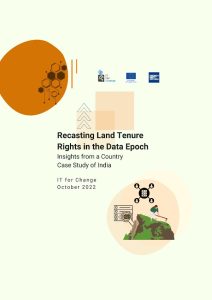
 KEY MILESTONES
KEY MILESTONES
- Expanding conversations around digitalization and agriculture. We organized a policy roundtable in partnership with SEWA Cooperative Federation and Vrutti Livelihood Impact Partners to explore the emerging intersections between digitalization and agriculture in India. In collaboration with FIAN International, we also undertook a case study to explore emerging land and agricultural digitalization trends in India, and their impact on the tenure rights of marginal farmers, small-scale producers, and forest communities.
- Creating a blueprint for gender-responsive platforms. We undertook baseline surveys with three social enterprises covering over 500 women workers to co-design and create a techno-institutional design blueprint for gender-responsive platforms.
 WHAT’S ON THE HORIZON?
WHAT’S ON THE HORIZON?
- A learning network on regenerative AI to explore the possibility of AI models that promote just and fair economies
- Deepening our local-to-global advocacy on food systems, agro-ecology, and data justice in partnership with traditional groups working on these issues
Recommendations from the Vault
- Read our case study on ‘Recasting Land Tenure Rights in the Data Epoch: Insights from a Country Case Study of India’
- Check out our analysis on food security data on Bot Populi